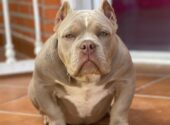It’s a common misconception that Pitbulls are aggressive dogs that are unsuitable to be kept as companions, but this isn’t the case at all. Instead, if a Pitbull is raised in the right environment, they are one of the most affectionate and fiercely loyal dogs.
They are protective, kind, charming, funny, and very active – all the elements of a brilliant companion.
Owning a dog comes with the horrible knowledge that someday, you will lose them. It’s never nice to think about the lifespan of a dog who has become an essential part of the family, but it’s all part of the responsibility of owning a pet.
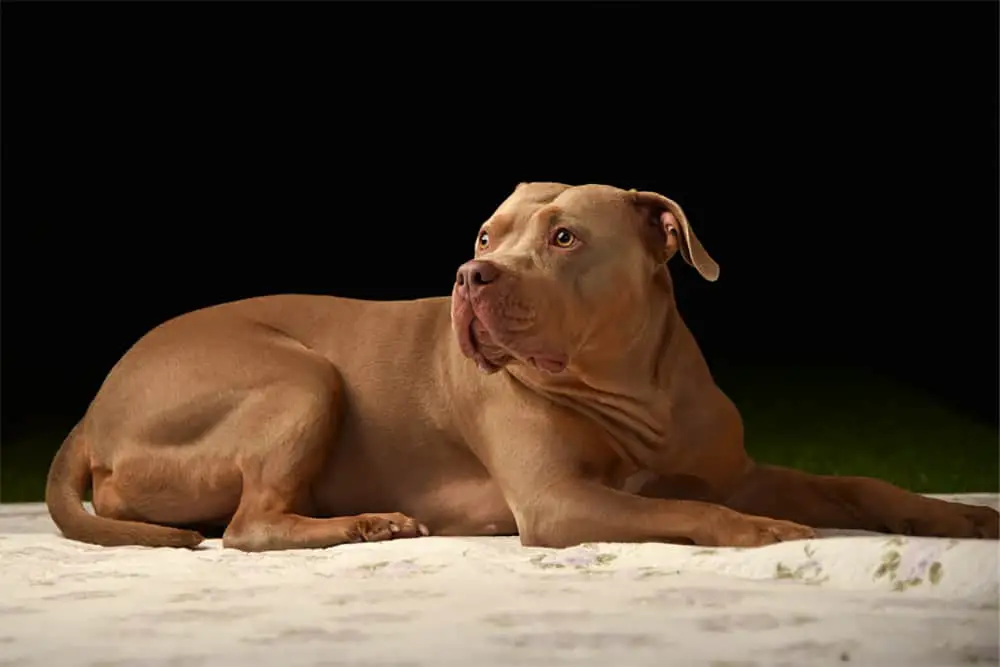
If you own a Pitbull, or if you’re thinking of owning a Pitbull, odds are you’ve probably wondered “how long do Pitbulls live?”.
You’ve got to consider the lifespan expectancy of a dog breed as well as the possible health risks that the breed is predisposed to. Here is everything you need to know about the lifespan expectancy of Pitbulls!
Lifespan Expectancy Of A Pitbull
Any Pitbull is expected to have a lifespan of 8-16 years, and the average lifespan for a healthy Pitbull is between 10 and 14 years. Of course, the large range in this lifespan is due to potential health issues such as accidental injuries, unexpected health problems, or genetic diseases.
Before we go into detail about the life expectancy of a Pitbull, it’s important to remember that the term “Pitbull” doesn’t refer to a specific breed. Instead, “Pitbull” is used to describe several breeds of dogs under an umbrella term.
These breeds include American Staffordshire Terriers, American Pit Bull Terriers, American Bullies, Staffordshire Bull Terriers, and often American Bulldogs.
Therefore, as the word “Pitbull” is used as an umbrella term for several breeds of dogs, it’s hard to say what their definitive life expectancy is. Here are the lifespans of each breed of Pitbull:
- American Staffordshire Terrier: 12 to 16 years
- American Bully: 8 to 15 years
- Staffordshire Bull Terrier: 12 to 14 years
- American Pit Bull Terrier: 8 to 15 years
- American Bulldog: 10 to 15 years
The range in life expectancies is due to genetic disorders and health problems that each breed is predisposed to.
Pitbull Expected Health Conditions
As there are several breeds within the umbrella term of “Pitbull”, here are the general health conditions that most (if not all) Pitbull breeds are prone to.
Obesity
Pitbulls require frequent exercise to prevent weight gain, because these breeds are prone to obesity. Obesity in dogs might look adorable, but it actually comes with a myriad of health issues such as arthritis, high blood pressure, joint pain, and diabetes.
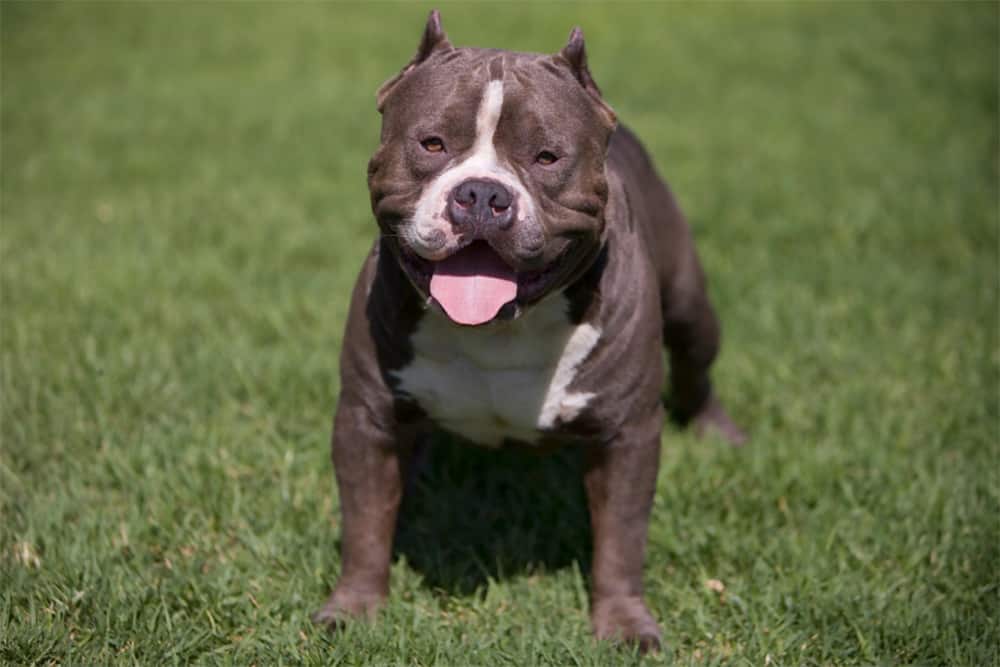
These health problems can turn into nastier and potentially fatal ones such as heart disease, which can significantly decrease the lifespan expectancy of the dog.
Hip Dysplasia
Hip dysplasia is usually an inherited condition that causes the dog pain and discomfort in its hips, all because the hips haven’t been formed properly. This usually starts off as lameness in the hind legs and limping, which can then lead to arthritis.
Problem is, most dog owners will assume that their dog is limping from a temporary injury or too much exercise. While this might be the case, it’s always worth taking your dog to the vet when you notice your dog has been limping for an extended period of time.
Skin Infections
Unlike dogs like Labrador Retrievers, the Pitbull breeds don’t have thick coats. This means that their thin coats offer little protection against skin infections and irritants, such as sun burn, allergies, rashes, and general cuts.
Bacteria and viruses have an easy way of getting through to the Pitbull’s body because of their thin coats, leaving to nasty infections.
Cream-colored and blue-nosed Pitbulls are the most susceptible to skin infections due to the pigment of their skin and coat. All Pitbulls are also prone to dry skin, which is why it’s important to find the right dog shampoo to cater for their sensitive skin and coats.
Allergies
As with skin infections, Pitbulls are prone to allergies. It is believed that their sensitive skin is one of the reasons why they are so susceptible to allergies from ticks, fleas, pollen, and grass.
Infections can start when the dog continuously scratches, licks, or bites the area, which is why it’s essential to get a treatment plan sorted as soon as possible.
Cataracts
Unfortunately, cataracts are a problem that a lot of dog breeds might face as they get older. Pitbulls in particular have a 50/50 chance of developing cataracts, which can be either hereditary or developmental.
It can also be a side effect of other health problems. In most cases, a treatment plan of pharmaceutical ointments can soothe and prevent blindness – otherwise, the only other option is surgery.
Knee Problems
Pitbulls are energetic dogs that love to zoom around, go for walkies, and exercise daily. As a result of this, the strain on their CCL (cranial cruciate ligament) gets progressively worse.
A partial tear in the CCL (which is like the dog version of a human’s ACL) can lead to limping and pain, but in some cases the ligament will tear completely, resulting in surgery.
Heart Problems
Pitbulls are prone to congenital heart disease, aortic stenosis, and valve malformations. Each heart problem comes with their own symptoms, but in a lot of cases, your Pitbull might simply seem lethargic.
As a result of this, it’s essential that you take your dog to the vets regularly for health check-ups where they can look for irregular heartbeats or labored breathing.
Accidental Reasons For A Shorter Lifespan
Owning a dog like a Pitbull comes with one of the major downfalls of people’s opinions about the breeds. People are very quick to assume that your Pittie is aggressive, but with proper care and training, this won’t be the case at all.
Any dog can be aggressive if they haven’t been brought up properly. Still, fights can happen between dogs, and if your Pitbull is caught up in one this can often lead to the dog being put down.
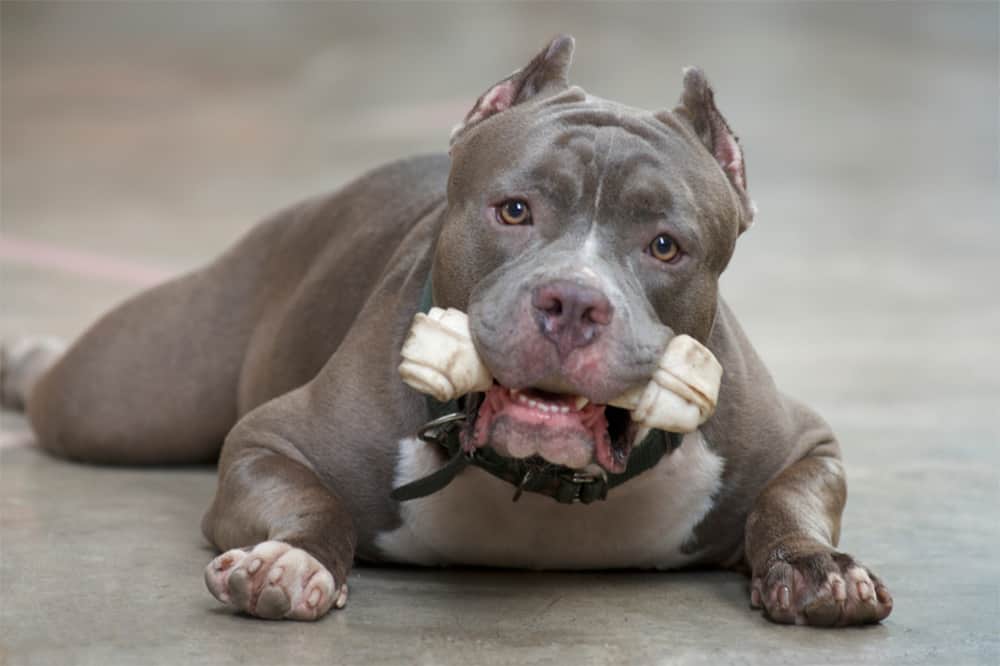
This is all because of the misconceptions surrounding Pitbull breeds.
Other accidental reasons for a shorter lifespan include car accidents, injuries, catching a virus from other dogs (such as parvovirus), and exposure to chemicals and toxins in food.
The best way to prevent these accidents from happening is to train your dog to walk properly off the lead. If they’re not trained to come back when you call their name, they can easily run into the road or find a source of polluted water.
How To Keep Your Pitbull Healthy
It might seem like there’s a lot of horrible health conditions that your Pitbull might develop or inherit, but fortunately, there are ways to prepare yourselves for these problems.
There’s even a few things you can (and should!) do to prolong the lifespan of your Pitbull.
While you might feel a bit low after reading the long list of potential health issues that your dog might encounter, it’s important to remember that prevention is key. Some Pitbulls have been recorded to live up to 20 years in complete health!
Here is how to keep your Pitbull healthy to extend its lifespan expectancy.
Genetic Testing And Medical Records
Everyone knows the importance of buying a dog from a reputable breeder. It’s not just so you avoid financially contributing to a puppy farm or backyard breeder – reputable breeders will offer medical records of the litter and the parents of the litter.
These records indicate any health conditions or potential hereditary problems that any owner must be aware of to make sure they can provide their puppy with the best care.
Backyard breeders won’t have this information, partly because they don’t care about the health of their dogs, but also because they know that the medical records will expose a myriad of health problems that will stop their litters from being sold.
Reputable breeders should also commit to genetic testing. Genetic testing of the parents of the litter will highlight any hereditary problems within the genes of the family. As most of the health problems a Pitbull might encounter are generally inherited, strict DNA testing is an essential step.
Of course, a lot of health problems won’t stem from genetics, but it’s always good to be ahead of the game!
Diet And Exercise
To keep your Pitbull as healthy as possible, you’ve got to commit to exercising them daily and feeding them the right diet. Without taking them on daily walks/runs/hikes, and without giving them a proper diet, your Pitbull can be exposed to developing arthritis, obesity, and often an early death.
Pitbulls love a change of scenery, so mix up your exercise! You should take them on a walk every day, but treat them (and yourself) to a swim in the river, a hike up a mountain, and games of fetch. However, make sure not to overwork your Pitbull, because they are prone to developing knee and hip problems.
The best type of diet for a Pitbull is a high-protein and low-carb diet. Each Pitbull breed will have their own dietary requirements, but as long as you avoid buying cheap commercial stuff that’s filled with preservatives and fillings, they’ll be a happy and healthy dog.
Spaying And Neutering
Most reputable breeders will only sell their puppies on the basis that the puppies must not be bred from to prevent health problems, which is why spaying or neutering your dog is so important.
Spaying or neutering won’t just prevent pregnancies – these surgeries will also prevent prostate cancers, bowel movement problems, and pyometra.
Indoor Vs Outdoor Dogs
There are pros and cons to owning your dog in an apartment or in a home with a backyard.
While indoor dogs don’t get the benefits of going out for exercise whenever they like, they aren’t exposed to a myriad of risks such as car accidents, extreme weather conditions, and dog fights.
Outdoor dogs have a significantly lower lifespan expectancy for these reasons – but this is just the risk you have to take when it comes to owning a dog.
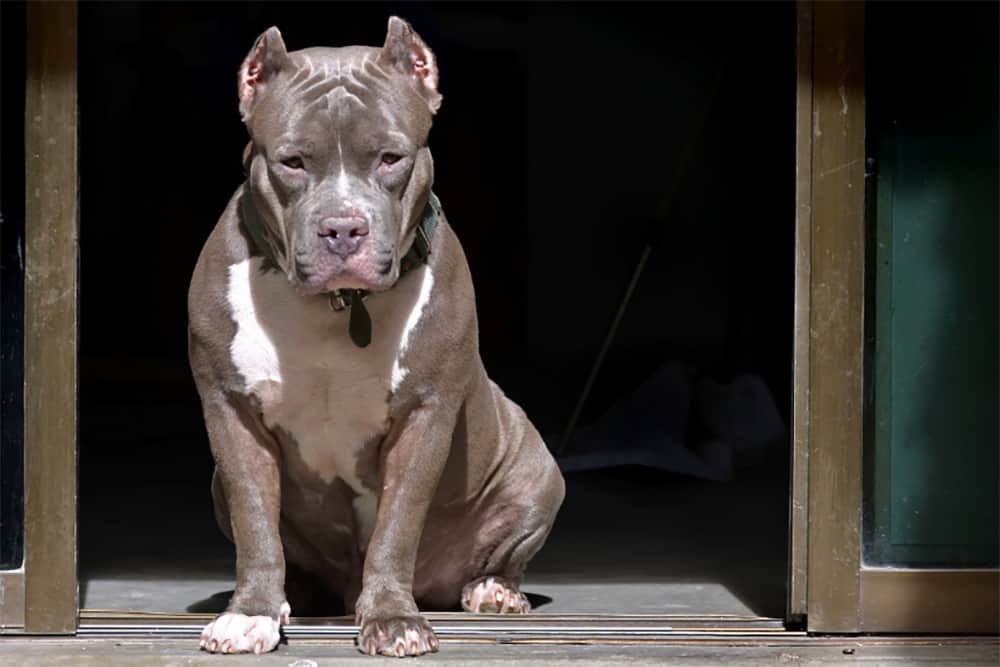
In general, it’s not wise to keep your dog in the backyard. Dogs are meant to be a companion and family member, so keeping them in a kennel outside isn’t the kindest environment you can give them.
Instead, you should create healthy boundaries with your dog and your furniture (if that’s why you intend to keep your dog outdoors). They will need a comfortable and warm place to sleep to prevent their joints from seizing up, too.
Regular Health Check-Ups
Prevention is key when it comes to owning a healthy dog. You should book regular health check-ups with your local vets to ensure that your dog is happy and healthy. Think of it like an MOT for your car!
Also, regular vet trips will help to create a positive relationship between the vet, the practice, and the dog. It’s common for dogs to have a negative association with the vets, which can lead to anxiety and even aggression, so frequent visits from a young age should work to combat this.
Grooming
Just because Pitbulls have thin coats doesn’t mean they won’t need grooming regularly! Like we said, Pitbulls are prone to skin infections due to their sensitive skin, so it’s important to keep their skin and coats clean from bacteria, pollen, grass, and fleas.
Make sure to invest in a high-quality and organic dog shampoo that is suitable for those with sensitive skin. You should look to wash your Pitbull once a month.
Grooming also means you will need to brush their coats to get rid of parasites, trim their nails, and commit to adequate dental care.
Dental chews are brilliant for this, plus you should invest in a dog toothbrush and toothpaste to prevent gum disease and tooth loss. Tooth loss leads to malnutrition because the dog can’t eat their food, so oral hygiene is essential.
Caring For An Old Pitbull
As with any living being, a senior Pitbull will require more care to prevent any nasty health conditions.
A dog is considered a senior dog at around 8 or 10 years, so at this time, it’s important to keep an eye on their behavior – both physical and emotional.
Naturally, there will be a decline in their energy levels, but other behavioral concerns include lethargy, limping, lack of appetite, poor stool and urine, and general confusion.
Here are our top tips for owning and caring for an old Pitbull:
- Commit to vet check-ups more frequently than when the dog was younger
- Slow down on the exercise and know when to take your dog home
- Increase the grooming and dental hygiene of your dog
- Keep your dog warm and hydrated
- Give them lots of affection and don’t leave them for long periods of time if you have any concerns
- Slow down on giving them treats which can cause weight gain
Saying Goodbye To Your Dog
Unfortunately, it’s inevitable that your dog will grow old and pass away at some point. What matters is that you provide your companion with the most comfortable end to its life to prevent any unwanted and unnecessary stress – both for the dog and yourselves.
Losing a pet is likened to losing a family member, and for good reason, so it’s important to try and make everything as smooth as possible for your dog to say goodbye.
In the event where you are forced to make a decision between allowing your dog to pass naturally or putting it to sleep, it’s often kinder to opt for the second alternative.
Having your dog put down is utterly horrible, but if the vet has recommended that it is the best thing to do because of the amount of pain the dog is in, it might be your only option. It’s important to remember the wonderful life you gave your dog, and vice versa, in this time.
Conclusion
The reality of owning any pet is that you will have to accept the risk of losing them. Pitbull breeds are an incredible addition to the family, which is why it’s so important to give them the healthiest life possible to extend their lifespan.
Healthy Pitbulls can live up to and over 16 years, so don’t let this guide bring you down! Just remember – prevention is key.

